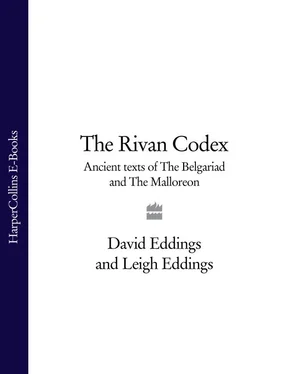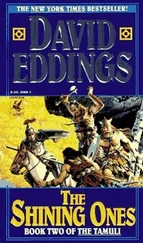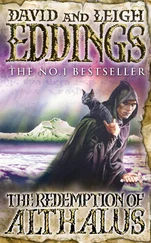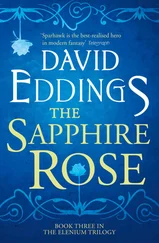I’m not passing along these gossipy little tales for the fun of it, people. There’s a point buried in most of them. The point to this one is the importance of the sound of names in High Fantasy. Would Launcelot impress you very much if his name were ‘Charlie’ or ‘Wilbur’? The bride of my youth spends hours concocting names. It was – and still is – her specialty. (She’s also very good at deleting junk and coming up with great endings.) I can manufacture names if I have to, but hers are better. Incidentally, that ‘Gar’ at the center of ‘Belgarath’, ‘Polgara’, and ‘Garion’ derives from proto-Indo European. Linguists have been amusing themselves for years backtracking their way to the original language spoken by the barbarians who came wandering off the steppes of Central Asia twelve thousand or so years ago. ‘Gar’ meant ‘Spear’ back in those days. Isn’t that interesting?
When the preliminary studies were finished, my collaborator and I hammered together an outline, reviewed our character sketches, and we got started. When we had a first draft of what we thought was going to be Book I completed, I sent a proposal, complete with the overall outline, to Ballantine Books, and, naturally, the Post Office Department lost it. After six months, I sent a snippy note to Ballantine. ‘At least you could have had the decency to say no.’ They replied, ‘Gee, we never got your proposal.’ I had almost dumped the whole idea of the series because of the gross negligence of my government. I sent the proposal off again. Lester liked it, and we signed a contract. Now we were getting paid for this, so we started to concentrate.
Incidentally, my original proposal envisioned a trilogy – three books tentatively titled Garion, Ce’Nedra, and Kal Torak. That notion tumbled down around my ears when Lester explained the realities of the American publishing business to me. B. Dalton and Walden-books had limits on genre fiction, and those two chains ruled the world. At that time, they wanted genre fiction to be paperbacks priced at under three dollars, and thus no more than 300 pages.
‘This is what we’re going to do,’ Lester told me. (Notice that ‘we’. He didn’t really mean ‘we’; he meant me. ) ‘We’re going to break it up into five books instead of three.’ My original game plan went out the window. I choked and went on. The chess-piece titles, incidentally, were Lester’s idea. I didn’t like that one very much either. I wanted to call Book V In the Tomb of the One-Eyed God. I thought that had a nice ring to it but Lester patiently explained that a title that long wouldn’t leave any room for a cover illustration. I was losing a lot of arguments here. Lester favored the bulldozer approach to his writers, though, so he ran over me fairly often.
I did win one, though – I think. Lester had told me that ‘Fantasy fiction is the prissiest of all art-forms.’ I knew that he was wrong on that one. I’ve read the works from which contemporary fantasy has descended, and ‘prissy’ is a wildly inappropriate description (derived, no doubt, from Tennyson and Tolkien). I set out to delicately suggest that girls did, in fact, exist below the neck. I’ll admit that I lost a few rounds, but I think I managed to present a story that suggested that there are some differences between boys and girls, and that most people find that sort of interesting.
All right, ‘Time Out’. For those of you who intend to follow my path, here’s what you should do. Get an education first. You’re not qualified to write epic fantasy until you’ve been exposed to medieval romance. As I said earlier, there are all kinds of medieval literature. Look at the Norse stuff. Try the German stories. (If you don’t want to read them, go see them on stage in Wagnerian operas.) Look at Finland, Russia, Ireland, Iceland, Arabia – even China or India. The urge to write and read High Fantasy seems to be fairly universal.
Next comes the practice writing. I started on contemporary novels – High Hunt and The Losers. (The publication date of The Losers is June 1992, but I wrote it back in the 1970s. It’s not strictly speaking a novel, but rather is an allegory, the one-eyed Indian is God, and Jake Flood is the Devil. Notice that I wrote it before we started the Belgariad.) If you’re serious about this, you have to write every day, even if it’s only for an hour. Scratch the words ‘week-end’ and ‘holiday’ out of your vocabulary. (If you’ve been very good, I might let you take a half-day off at Christmas.) Write a million or so words. Then burn them. Now you’re almost ready to start.
This is what I was talking about earlier when I suggested that most aspiring fantasists will lose heart fairly early on. I was in my mid-teens when I discovered that I was a writer. Notice that I didn’t say ‘wanted to be a writer’. ‘Want’ has almost nothing to do with it. It’s either there or it isn’t. If you happen to be one, you’re stuck with it. You’ll write whether you get paid for it or not. You won’t be able to help yourself. When it’s going well, it’s like reaching up into heaven and pulling down fire. It’s better than any dope you can buy. When it’s not going well, it’s much like giving birth to a baby elephant. You’ll probably notice the time lapse. I was forty before I wrote a pub-lishable book. A twenty-five year long apprenticeship doesn’t appeal to very many people.
The first thing a fantasist needs to do is to invent a world and draw a map. Do the map first. If you don’t, you’ll get lost, and picky readers with nothing better to do will gleefully point out your blunders.
Then do your preliminary studies and character sketches in great detail. Give yourself at least a year for this. Two would be better. Your ‘Quest’, your ‘Hero’, your form of magic, and your ‘races’ will probably grow out of these studies at some point. If you’re worried about how much this will interfere with a normal life, take up something else. If you decide to be a writer, your life involves sitting at your desk. This is what you do to the exclusion of all else, and there aren’t any guarantees. You can work on this religiously for fifty years and never get into print, so don’t quit your day-job.
It was about the time that we finished Book III of the Belgariad that we met Lester and Judy-Lynn del Rey in person. We all had dinner together, and I told Lester that I thought there was more story than we could cram into five books, so we might want to think about a second set. Lester expressed some interest. Judy-Lynn wanted to write a contract on a napkin. How’s that for acceptance?
We finished up the Belgariad, and then went back into ‘preliminaries’ mode. Our major problem with the Malloreon lay in the fact that we’d killed off the Devil at the end of the Belgariad. No villain; no story. The bad guys do have their uses, I suppose. Zandramas, in a rather obscure way, was a counter to Polgara. Pol, though central to the story as our mother figure, had been fairly subordinate in the Belgariad, and we wanted to move her to center stage. There are quite a few more significant female characters in the Malloreon than in the Belgariad. Zandramas (my wife’s brilliant name) is Torak’s heir as ‘Child of Dark’. She yearns for elevation, but I don’t think becoming a galaxy to replace the one that blew up was quite what she had in mind. The abduction of Prince Geran set off the obligatory quest, and abductions were commonplace in medieval romance (and in the real world of the Dark Ages as well), so we were still locked in our genre.
We had most of our main characters – good guys and bad guys – already in place, and I knew that Mallorea was somewhere off to the east, so I went back to the map-table and manufactured another continent and the bottom half of the one we already had. We got a lot of mileage out of Kal Zakath. That boy carried most of the Malloreon on his back. Then by way of thanks, we fed him to Cyradis, and she had him for lunch.
Читать дальше












